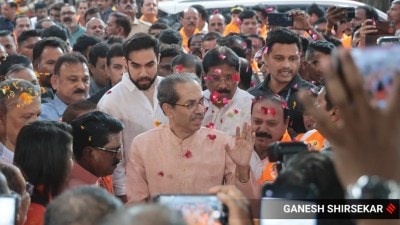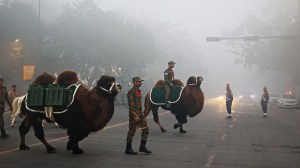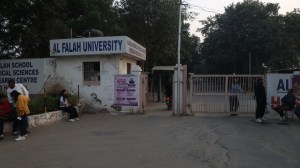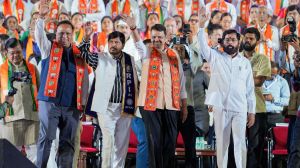In June 1988, senior bureaucrats of the Jammu amp; Kashmir Government arrived in New Delhi for a meeting with Home Minister L.K. Advani. They carried with them a detailed agenda, urging the Centre to take a 8220;sympathetic8221; view of their demands in view of the 8220;pressing problems8221; they faced. The agenda listed demands under heads like security-related expenses, debt waivers, the non-plan deficit as well as assistance for hydel, communication and environmental projects. In other terms, the demand just meant: Rs 9,728 crore.
A month later, the Planning Commission announced an annual plan for Jamp;K of Rs 1,900 crore along with Rs 1,280 crore for its non-plan deficit. A majority of the other demands, were kept on the 8220;pending8221; list and are now being discussed, one by one.

Unfortunately, fears expressed during the June meeting 8212; of all new developmental activities being affected 8212; have come true and the extent to which the Centre should finance Jamp;K8217;s process of restoration and development turned into a deeplypoliticised issue.
And even as the political leadership steps up pressure in New Delhi, bureaucrats in Srinagar are evidently worried about the slowdown of development work and inevitable cost over-runs. Says S.L. Bhat, divisional commissioner of Kashmir, 8220;What we are seeing in Jamp;K is a whole chain of consequences. It is a manifestation of what happened here in the last decade social, political and finally, economic disorder.8221;
There are others who admit that besides making 8220;exorbitant8221; demands, the Farooq Abdullah Government can be faulted for the over-zealousness it displayed while making budgetary allocations last year itself. According to M.L. Koul, director general of the Institute of Management and Public Administration IMPA, and till recently the financial commissioner planning, the fiscal crisis had, in fact, set in by end-1997 and the early warnings given by officials like him were ignored.
Koul says the situation worsened because the State Government did not adopt a systemic approachto planning and development. 8220;Controls and systems were not been fully revived. Once the Government started spending money, it made the crucial mistake of not taking recourse to administrative approvals and costing,8221; he said.
A similar prognosis has been made in a 350-page report on economic reforms submitted recently by a committee headed by former Home Secretary Madhav Godbole 8212; the first official attempt at a post-mortem of the State8217;s threatened economy. Several top-level State officials were on the panel and copies have, since, been circulated to the Centre and key officials in the State. The beleaguered Jamp;K Government can seek solace in some recommendations of the panel, which has asked the State to put 8220;its financial house in order.8221; For instance, Godbole has goaded New Delhi to adopt a 8220;uniform policy8221; of waiver of Central loans as it has written off huge quantum of loans to Punjab and Assam. The waiver of loans estimated at Rs 2,545 crore, the report states, was essential 8220;to avoid anyfeeling of grievance in Jamp;K.8221;
Story continues below this ad
The panel has also asked for a 8220;one-time grant8221; for helping Jamp;K wipe out its bank overdraft, now touching Rs 944 crore. The overdraft is over and above the 8220;liberal8221; Central financial assistance given to Jamp;K, but which should now be helped to start with a 8220;clean state.8221; Jamp;K should also change over to banking with the Reserve Bank of India RBI and abide by he same rules applicable to other States.
On the flip side, the Godbole report recommends the following to help Jamp;K achieve an economic turnabout:
Jamp;K should discontinue the 8220;highly questionable and undesirable8221; practice of, year after year, showing non-plan expenditure as plan expenditure to artificially increase the plan size. The Ninth Five Year Plan of the State did not have any new insights. It read like any previous plan document and now needed to be recast.
The grant of subsides, both explicit and implicit, had reached 8220;large and overwhelming.8221; In 1997-98, the subsidies amounted to Rs 1,451crore, which is almost the quantum of its plan size and about 43 per cent of the non-plan expenditure. Such a level of subsidies was 8220;unconscionable8221; and needed to be reduced by imposing user charges on a wide range of services.
The Government also needed to limit its own size. While tax and non-tax revenues for 1998-99 were just Rs 767 crore, the budget for salaries, pensions and retirement benefits was Rs 2,563 crore. The number of Government employees has risen from Rs 1.3 lakh in 1977 to 2.8 lakh in 1997. Increasing employment was not the most 8220;effective8217; way of spending scarce resources and there must be a 5 per cent reduction of staff strength in the next five years.
Besides these, the committee has also exposed some 8220;questionable8221; practices adopted by the Government. For one, just like the state of West Bengal, Jamp;K too had begun opening public ledger accounts PLAs and crediting un-spent amo-unts at the end of the year. Secondly, the Government had adopted a 8220;short-sighted policy8221; ofencouraging consumption of alcoholic drinks with a view of mobilising large revenues.
This, the report warns, should not lead to increasing the hold of criminals, mafia dons and other anti-social elements by cartelisation.Top officials in the State Secretariat point out, that the Centre had also listed some 8220;options8221; for reducing their fiscal deficit. They had, for instance, asked them to hold payment of arrears due to Government employees in view of the recommendations of the Fifth Pay Commission. The subject of revision of salaries, is, incidentally, is yet another bone of contention between the Centre and State since members of the National Front maintain they 8220;inherited8221; the hike: the parity with Central Government scales was granted during Governor8217;s rule, bringing up an additional annual liability of Rs 325 crore.
Story continues below this ad
The Central Government has also suggested that Jamp;K adopt other drastic measures like stoppage of all Provident Fund withdrawals. Chief Minister Farooq Abdullah told The Indian Expressthat the suggestions are 8220;untenable.8221; Ajit Kumar, the additional chief secretary finance, also described them as 8220;impractical8221; and says they have almost turned the suggestions down.
Chief Secretary Ashok Jaitley says that given the state of economic distress of Jamp;K, the only tangible solution could come by way of the Centre agreeing to cover the shortfall in their non-plan deficit of Rs 720 crore. 8220;This is the crux of the problem and we, after all, only have New Delhi to appeal to, 8221; he said.

































